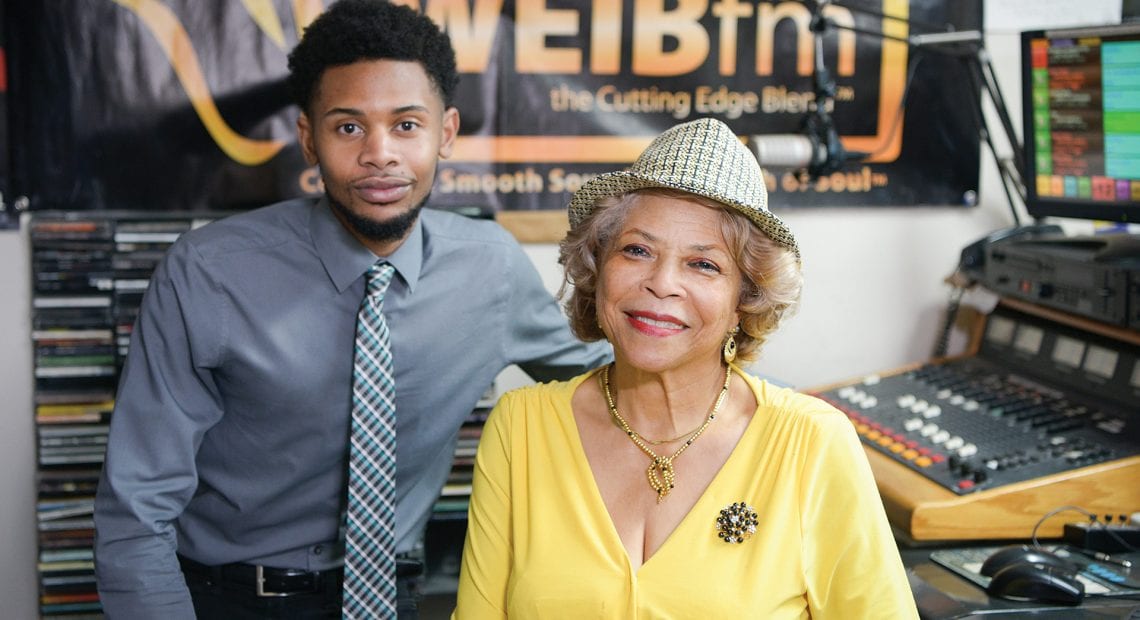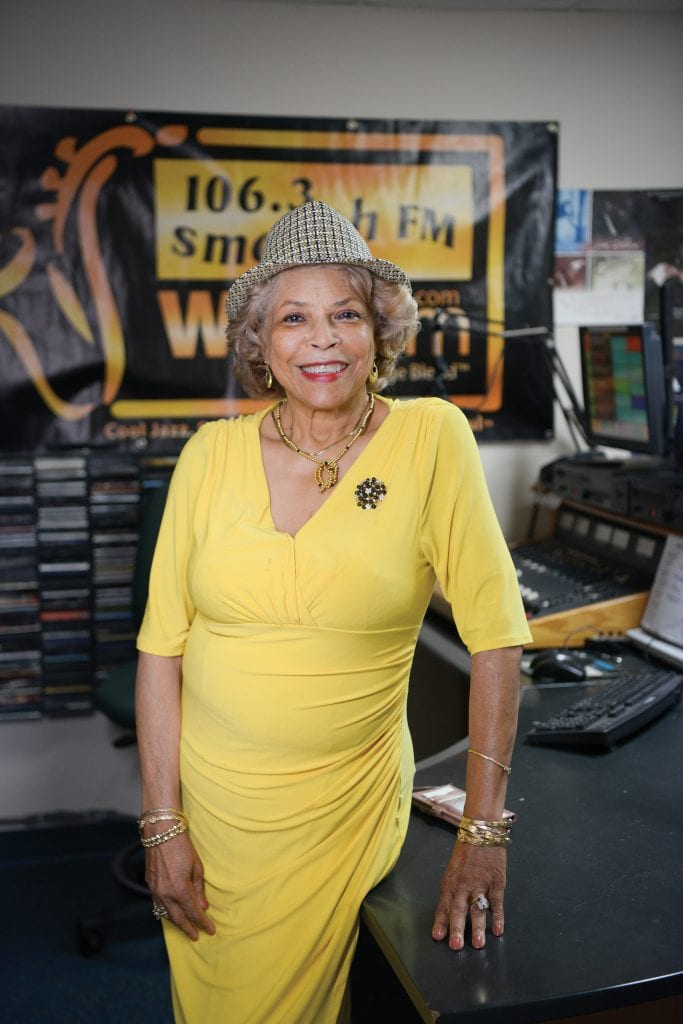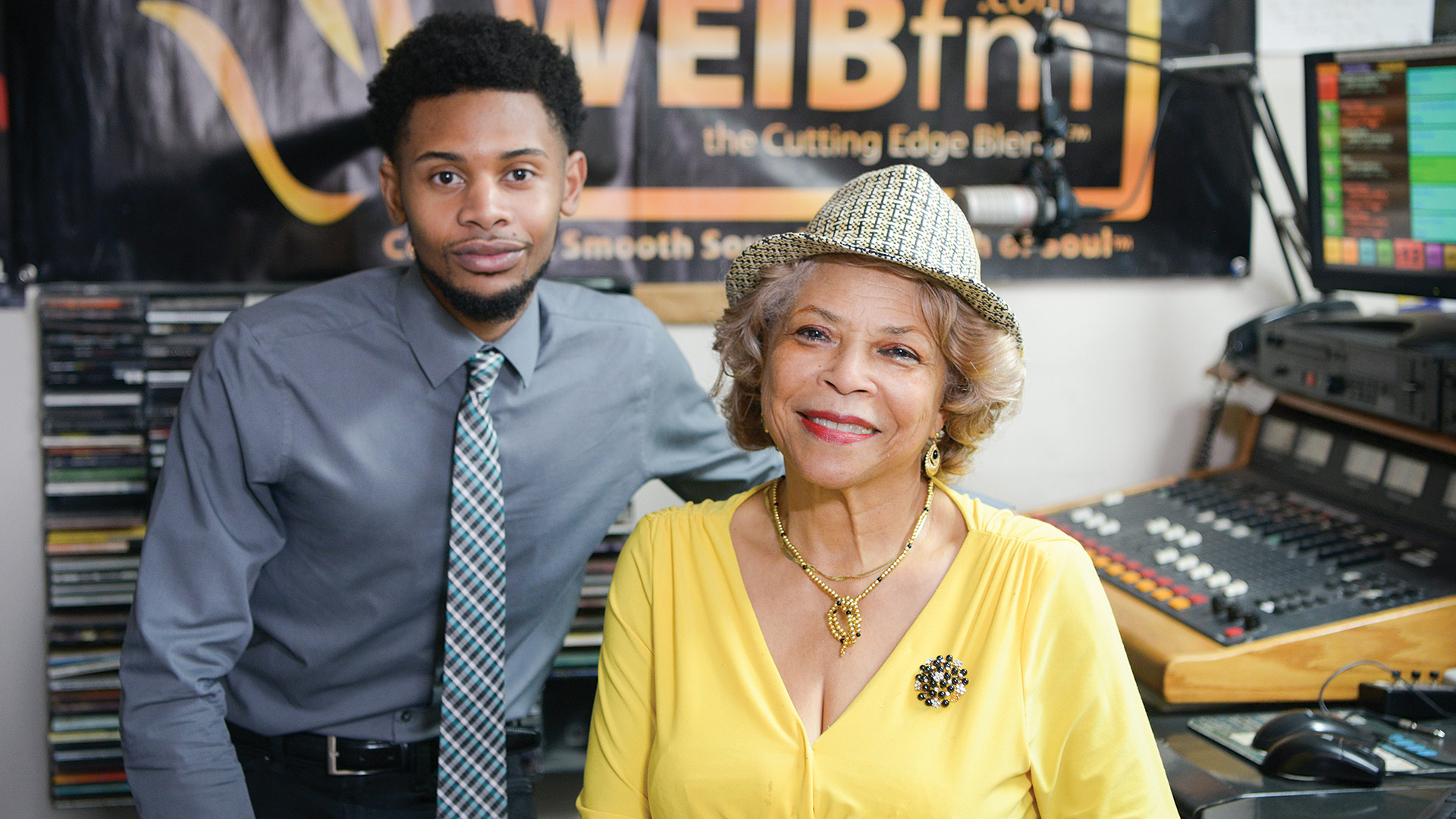
Carol Moore Cutting
President, CEO, and General Manager, Cutting Edge Broadcasting
 This Radio Pioneer Has Overcome Obstacles to Better Her Community
This Radio Pioneer Has Overcome Obstacles to Better Her Community
“Success,” Booker T. Washington once said, “is to be measured not so much by the position that one has reached in life as by the obstacles which he has overcome.”
By both standards, Carol Moore Cutting is certainly a woman of impact.
It’s a quote she has long loved, not only because she admires Washington — who established Tuskegee University in Alabama, where she earned a degree and met her husband — but because of the truth it reflects about her own life, and the lives of others with a passion or dream that encounters stress, hardship, and opposition.
“Booker was very much an entrepreneurial person who built Tuskegee from nothing,” said Cutting, who grew up in a rural, segregated area of Alabama and came to Massachusetts with some entrepreneurial dreams of her own.
It was her husband’s first job that led them to settle in Longmeadow; Dr. Gerald Cutting, now retired, is a Boston native who eventually opened his own veterinary practice in Chicopee. Carol was initially struck by how difficult it was to connect with places where communities of color gathered — in particular, how little community information was available on the radio at the dawn of the ’70s.
“I grew up believing, when you come into a situation, you ask, ‘what can I do to improve it?’ As naïve as I was — I was very young — I began to do research at the library.” That research, on what was required to launch a career in broadcasting, led to a license from the Federal Communications Commission in 1971.
But that’s just the start of the story that saw the birth, 28 years later, of WEIB 106.3 FM in 1999 — currently the only locally owned commercial FM radio station in the Greater Springfield market, the only female-owned FM radio station in Massachusetts, and the only station — AM or FM — in New England owned by a person of color, and now celebrating its 20th anniversary of eclectic programming, community awareness, and, yes, impact.
“As an innovative thinker who believes that, more often or not, ‘no’ is a possible ‘maybe,’ Carol Moore Cutting has not allowed obstacles stand in her way of progress,” said Irene Thornton, who is both an on-air host and a member of the administrative, operations, and sales team at WEIB, in nominating Cutting for this award.
“In a world dominated by men, she has made bold decisions to command an on-air staff that is overwhelming female,” Thornton added. “She has broken the well-established industry stereotype that women are to be relegated as a second voice, a two-dimensional entity on the radio, and has placed women in her prime-time programing schedule. These women, most without formal training in radio communication, were mentored by Mrs. Cutting to become recognized and award-winning on-air hosts. These voices, with her support, are setting a standard for the next generation of female broadcasters who want to pursue the airways as themselves.”
“I grew up believing, when you come into a situation, you ask, ‘what can I do to improve it?”
That sort of pass-it-on influence is gratifying to Cutting, who has drawn inspiration from a strong role model in her mother and a series of pioneers who came before her.
“We had no resources, no money, and we were young,” she said of her idea to create the radio station. “Looking back, you might say, ‘the nerve of you, how did you think you could do that?’ Well, Booker T. Washington built Tuskegee University from nothing, so why not?”
Heading North
Cutting traces much of her ambition, in broadcasting and in life, to high expectations placed on her by her educational mentors, but more importantly her mother.
“I was told I didn’t have to let where I came from dictate where I was going in life — because where I came from, as I said, was this very segregated, southern environment,” she recalled. “But I also came from a family where my mom was an excellent role model in terms of pushing yourself and striving toward your goal.”
Her mother, a teacher, was a role model in several ways, she explained — as a kind, giving person who embraced people, but also a determined, hard-working woman who would teach all day, then drive from Livingston to Montgomery for night school — a 120-mile trek each way — then go back to school the next day to teach.
“That was the kind of environment I grew up in,” Cutting said. So, when she caught the itch to build a radio station, she drew on the same sort of determination her mother had displayed. “We just believed, ‘why not? It’s a long shot, but why not?’ Fortunately, I had a supportive husband.”
Others were less supportive. Cutting applied for a construction license to build the station in 1984, but she had a long fight ahead, particularly with a competitor who fought her in various courts for a decade and a half.
“It wasn’t easy. It was a tough 15 years. To be honest, it was a lot of prayer and being patient because it did not happen as quickly as one would think,” she recalled. “But even if you’re discouraged and people challenge you, that doesn’t mean you should just stop because you’re afraid of them. Knowing he had more resources and he was already in broadcasting made it even more difficult. But I prevailed at every level, all the way to the D.C. Court of Appeals.”

Carol Moore Cutting with T.J. Williams, who has been able to combine his twin passions for music and marketing at the station.
At least the long fight gave her time to hone her vision of what the station should offer. By the time the WEIB started broadcasting in 1999, she had been part of civic life in Greater Springfield for almost three decades, developing an understanding of what would draw in listeners and, crucially, advertisers.
“Because of my learned experiences and growing up the way I did, I’m more focused on the community, so I wanted to incorporate community things as well as broaden the scope of listening opportunities with programming that didn’t exist in this area,” she explained, adding that music that stirred her spiritually was one consideration.
“As much as I like gospel music, this is a commercial radio station, and even though it was a deep part of my faith and upbringing, I wanted something that brought everyone into the mix,” she went on. “So I decided on smooth, contemporary jazz, but I didn’t want to say ‘smooth jazz.’”
In the end, the mix that emerged is what WEIB calls “cool jazz, smooth sounds, and a touch of soul, with a cutting-edge blend.”
“But it took me a while to commit to that,” she added, with the process entailing copious research, attending broadcasting conferences, and plenty of soul searching. “I wanted something anyone can listen to.”
That mix has drawn a loyal core of advertisers who appreciate the station’s blend of a rich musical experience with community-focused information. Cutting’s mission, Thornton said, “is about getting a message out to her dedicated and loyal listeners, who she sees as family. In her eyes, it is vital that they are aware that there is someone right here in their own backyard who can support their needs. By tying this together, she effectively affirms the concept that we are one community, which promotes businesses and individuals growing together.”
And because she’s so rooted and invested in the Greater Springfield community, it’s important to stay here — and stay independent — at a time when most stations are owned by large conglomerates, Cutting said.
“It’s been difficult at times. It’s challenging because of the consolidation in the industry. Other stations have told advertisers, ‘well, we can cover everything, the entire market. You don’t have to deal with this little, independent radio station.’ But that isn’t true because our listeners are loyal, and [larger entities] don’t reach the audience we reach.”
That reach isn’t just local, she noted, but regional and even global through WEIB’s website, from which anyone can listen live.
“We get people writing us from all over the world saying, ‘we wish your terrestrial radio station could reach us,’” she told BusinessWest. “ So, we have listeners, but it’s something we’ve had to build. It hasn’t come easy.”
Voices Raised
Cutting’s commitment to the community includes the arts, as she has sponsored myriad cultural organizations and jazz festivals in the Pioneer Valley and beyond. Meanwhile, the station’s “WEIB After Work Cool Down” program has offered a platform for up-and-coming musicians to showcase their talent.
The station has also supported non-arts-related nonprofits over the years through announcements and coverage, some with media sponsorships, but some of it under the radar. For example, Cutting was personally moved by TommyCar Auto Group’s annual Tom Cosenzi Driving for the Cure Golf Tournament, which raises money for brain-cancer research, because she had a friend with the same condition.
“We didn’t approach them as a sponsor, but we promoted the event because of its impact. We ran commercials about how people could get involved and put in on the website because it was creating awareness of something important,” she explained. “You don’t always have to get a pat on the back to do what’s right and use the resources you have.”
“As an innovative thinker who believes that, more often or not, ‘no’ is a possible ‘maybe,’ Carol Moore Cutting has not allowed obstacles stand in her way of progress.”
Of course, “we also do things in conjunction with organizations,” she was quick to add. “You can’t give away everything. I have to be careful because I have a soft heart and I empathize and I’m touched by so many needs in the community. If I was rich and had the resources, I’d be a force to be reckoned with. But we do have the radio station to get messages out.”
While striking that balance between lending community support and paying the bills, it helps that the station, unlike so many in America today, is locally owned.
“Because it’s local, we don’t have to go to corporate to decide what can we support. If we want to do something for breast-cancer awareness and there’s an event going on, or something for prostate cancer, we can do it. That’s what we strive for.”
Paying those bills is still a challenge, she said, because some potential advertisers will never see the value in partnering with a station with roots that are deeper than they are geographically broad. “They don’t get what we have to offer them, which is unique, and something they’re not going to find anywhere else in this market.”
The mother of two and grandmother of eight, Cutting has also taken on a caregiver role these days to her ailing husband — but says it’s a role she appreciates, cherishing the whole of their life together.
“My faith has seen me through some very challenging times, and I would say it continues. My strength doesn’t come from me,” she noted. “I tell people, ‘have faith and maintain and hang in there,’ and that’s what I’m doing with this radio station. It hasn’t always been the easiest time, to be honest with you, because of the fear of those who would minimize the impact we have the community.”
Twenty years of listeners, and organizations that have heard their voices amplified on the airwaves, would agree. So would the young African-American women who see Cutting as a role model and trailblazer.
They want to be inspired, she said — “and not just women of color, but any woman — and, I would venture to say, any person, because there’s no gender line, no racial line. People need to be encouraged.”
After all, you don’t need to be a national media giant to have an outsized influence.
“Don’t judge us by our size, but by the impact we have on this community,” she said. “We’re not corporately run — we are community-focused, yet with a broader regional and international flavor because we can be heard throughout the world.”
Joseph Bednar can be reached at [email protected]




